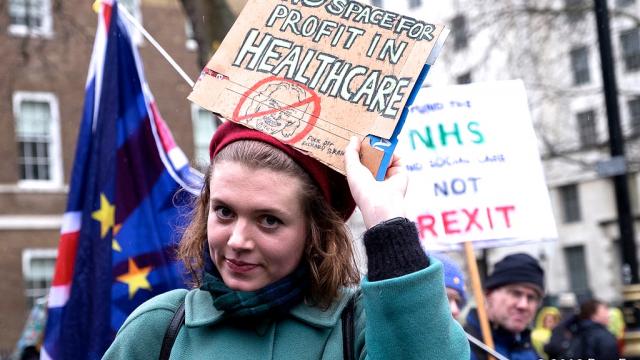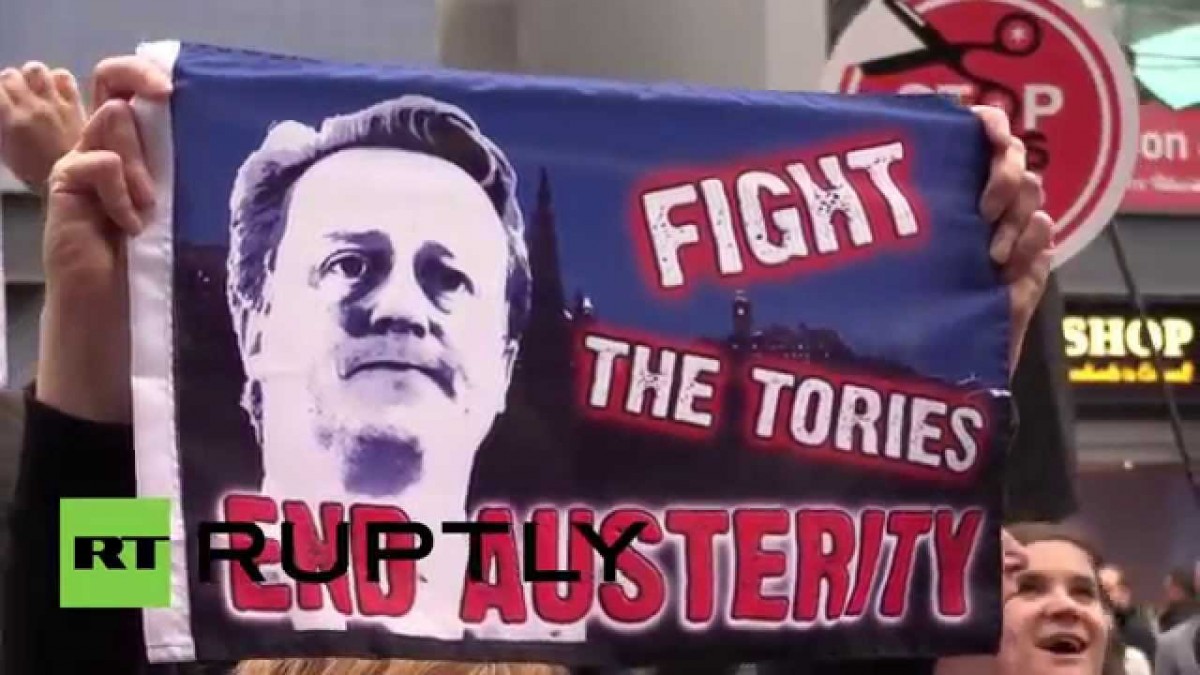
Warren Street in London is a busy place to be on any Saturday, but on Feb. 3 this bustling area of the capital reached extraordinary proportions when tens of thousands of demonstrators braved the rain to protest relentless, crippling cuts to the National Health Service.
Waving banners and placards that read "Saving money costs lives" and "Keep your hands off our NHS," the marchers slowly moved through London to their destination on Downing Street. The protest was organized by two pressure groups, the People’s Assembly and Health Campaigns Together, and it couldn't have come at a better time.
This winter is being labelled the worse winter on record for the NHS. Hospitals throughout the country have been operating in chaos in recent weeks, driven by a surge in admissions that has forced up to 12-hour delays for patients being treated in emergency wards. Many patients have been left on trollies in corridors when they were unable to receive a bed.
NHS figures show that in one week in January, 11,000 patients were cared for by ambulance crews for more than 30 minutes before they could be attended by Accident and Emergency (A&E) nurses. In just seven days, A&E units had to divert patients to other hospitals 20 times due to hospital overcrowding.
The data shows that bed occupancy at general and acute hospital wards is at 94.8 percent, significantly higher than the limit of 85 percent, which is considered "safe" to help reduce the spread of infections like MRSA and ensure that patients receive basic care.
On a recent Prime Minister Questions session in parliament, Theresa May nonetheless insisted that the British healthcare system was "better prepared for the winter than ever before," a statement that was greeted with immediate outcry and objection.
As Nick Scriven, president of the Society for Acute Medicine, told The Guardian: “Pressures in the system remain high, and it really is offensive and disingenuous to see the prime minister only yesterday remain adamant that the NHS was better prepared then ever this winter.”
Adding greater fuel to the fire, with an excruciating dose of irony, was the fact that May’s comments came as Health Secretary Jeremy Hunt had to apologize to patients who this winter had their operations either cancelled or delayed. Hunt admitted the NHS needed “substantially more resources” in order to cope with the “huge pressures” it faced.
Despite May's claims of preparedness, hospitals in England were told to delay routine outpatient appointments and pre-planned operations until the end of the month because of the intense pressure they are operating under this winter. Officials estimate the delay could result in up to 55,000 operations being deferred.
The Foreign Secretary Chimes In
Even the foreign secretary couldn’t help poking his nose into Britain’s worsening healthcare crisis. In his typically vocal manner, Boris Johnson publicly called for an extra £100 million a week for the NHS after Brexit. Johnson’s statements were quickly rebuked by the government, with Chancellor Philip Hammond reminding Johnson of his role in government.
“Mr Johnson is the foreign secretary. I gave the health secretary an extra £6 billion at the recent budget and we will look at departmental allocations again at the spending review when that takes place,” said a defiant Hammond.
Johnson’s reasoning behind his public demand for an extra £5 billion to help save the NHS remain unclear and widely speculated. One theory is that he may have been trying “to help restore his battered credibility and redeem any personal Brexit guilt.” Another is that Johnson believes the Tories must do more to save the NHS and convince the public that their health service is in caring and capable hands to fight off the threat of Jeremy Corbyn, who may win the next general election and become prime minister.
Worse Care than Ever
Nonetheless, the Tories’ damage to the NHS, once the healthcare envy of the world, has been profound. Under the Conservative governments of David Cameron and now Theresa May, Britain’s healthcare has been hailed the “worst in NHS history.”
For example, in 2015, under Cameron and then-Chancellor George Osborne, the NHS was asked to find £22 billion in savings by 2020 in order to keep afloat with rising demand and an ageing population. In its 2015 election manifesto, the Tories said they would provide £8 billion in government funding and expected the NHS to make £22 billion in savings to fill a $30 billion funding gap by the end of the decade.
But within a climate of unbridled austerity policies, people operating within the NHS are being pushed to their limits. In 2016, the high-profile doctors’ dispute, whereby junior doctors and ministers were locked in conflict over pay and working conditions, poignantly showed the crisis that was snowballing in the healthcare industry.
It was just one of many public displays of turmoil stemming from the relentless cuts and setbacks the NHS has been grappling with. Overworked nurses are leaving the profession in despair and morale is at an all-time low, with nursing staff feeling overstretched and undervalued.
Then there is the continuous privatization of the NHS, with private companies winning 70 percent of clinical contracts in England. Richard Branson’s Virgin Care won a staggering £1 billion worth of contracts. The company pays no tax in the U.K., yet it had the audacity to sue six NHS commissioning care groups in 2016 after it failed to win an £82 million care contract.
After tens of thousands of protestors took to London’s streets earlier this month to voice dismay about an NHS that is spiraling deeper into crisis, U.S. President Donald Trump couldn’t help adding some salt to the crisis, tweeting: “The Democrats are pushing for Universal HealthCare while thousands of people are marching in the U.K. because their U system is going broke and not working. Dems want to greatly rise taxes for really bad and non-personal medical care. No thanks!”
He failed to mention, of course, that ongoing austerity measures and cuts inflicted by the Tories has been the source of the NHS "going broke and not working." As Dr. Andrew Green, a general practitioner in East Yorkshire, tweeted: “The NHS is not failing, it is succeeding in doing amazing things despite underfunding. It is, however, being failed.”
Jeremy Pickard, a former senior data analyst for the NHS, said he believes consensus must reached on what the NHS can realistically deliver, and how it can be adequately resourced.
“Everybody (except the president of the USA) recognizes how fundamental the NHS is to how we feel as a society," Pickard told Occupy.com. "To match future capacity to demand we all have to agree what it will and will not deliver, and how we can resource it adequately. This will involve the sacrifice of some sacred cows on both the right and left of British politics.”
3 WAYS TO SHOW YOUR SUPPORT
- Log in to post comments












